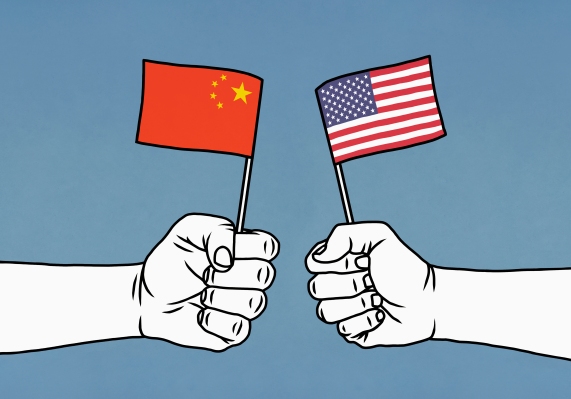While Tesla invested $1.5 billion in bitcoin, Gary Gensler, the chairman of the U.S. Securities and Exchange Commission, called the cryptocurrency space the “Wild West.” Meanwhile, in China, the government created its own digital currency while abruptly canceling the IPO of its most well-known fintech firm, AliPay, for regulatory reasons. It’s enough to give the casual observer whiplash. What is happening here?
With all the focus on the great technology race between the U.S. and China, little attention has been paid to an area with enormous implications: Who will lead the innovation and, therefore, control the technology behind international payments systems?
This race matters for two reasons.
First, Western countries’ leadership in international payments allows them to enforce sanctions against bad actors like Iran and North Korea. If Chinese solutions gain the dominant foothold in the developing world, this will become much harder.
Second, if the West leads in fintech, it can set reasonable world standards for this new field, such as protecting the environment, preventing illicit cross-border transactions and safeguarding consumer privacy. Reasonable and clear regulation is exactly what responsible U.S. companies — who don’t want to operate in a “Wild West” environment — have been asking for but not receiving.
In the meantime, China has taken the global lead in mobile payments, both in sophistication and scale. Ant Financial, AliPay, WeChat Pay and others comprise the world’s most advanced mobile payments market. For example, Alipay has over 1.3 billion users and more customers outside of China than all of PayPal’s user base. In aggregate, the $45 trillion in mobile transactions volume that Chinese merchants process annually is twice as large as what MasterCard, Visa and PayPal process each year combined.
In addition to these Chinese private sector innovations, the Chinese government has also developed the world’s most advanced central bank digital coin and has completed over 70 million transactions — totaling over $5 billion in revenue — since it was launched earlier this year. The digital yuan is a centralized currency supported by the full faith and credit of the Chinese government, versus traditional cryptocurrency, which is speculative. While the stated goal of the digital yuan is financial inclusion to help those Chinese without bank accounts, the currency’s centralized nature allows the Chinese government to monitor every transaction and restrict access if the Chinese citizen has a low score on the country’s social credit system.
If these Chinese leapfrog technologies gain an international following, they could make it very difficult for the West to enforce sanctions on bad actors, as former Treasury official Justin Muzinich and others have pointed out. Currently, the United States and its allies enforce international sanctions on Iran and North Korea, for example, by preventing Western companies from doing business there and halting banks from facilitating payments to these countries through the Society for Worldwide Interbank Financial Telecommunications (SWIFT) system and correspondent banking relationships.
Responsible fintech companies in the U.S. (including those that service crypto), also fully comply with “know your customer” and anti-sanction regulations. Due to the size and scope of the American financial system, this has been an effective deterrent to illicit behavior.
With the advance of the digital yuan and Chinese payments platforms, companies wouldn’t need U.S. or other Western banks to facilitate these payments and so sanctions would become very difficult to enforce and illegal payments by terrorists and criminals easy to hide. A combination of AliPay, other advanced payments platforms and the Chinese digital yuan could begin to circumvent this system. Sigal Mandelker and others have pointed out that due to the onerous regulations Western governments have asked banks to follow to create “correspondent banking relationships,” 75% of big U.S. and European banks are reducing the number of these relationships. This erodes America’s ability to influence international banks and crack down on illegal behavior.
Beyond sanctions, Western governments have other reasons to shape the rules of the new digital financial system. Current banking practices have many safeguards in place to protect against abuse. The West can only set similar standards for these technologies if we are in the lead. For example, the West will want to prevent criminals and terrorists from transferring money anonymously through cryptocurrencies like Bitcoin and others. Western governments should also set up safeguards that protect small-time investors from getting scammed, such as what happened when the Ethereum network fueled the initial coin offering trend in 2017-2018.
Finally, environmental regulations are needed. Digital currencies based on “proof of work (PoW),” such as Bitcoin, use an enormous amount of computing power which requires electricity and thus, creates massive carbon emissions. Mining Bitcoin, for example, which still uses the PoW model, uses about as much electricity per year as the entire country of Norway. In fact, multiple reports have explained that Tesla’s purchase of $1.5 billion in bitcoin may have erased a significant portion of the carbon emissions gained from that year’s sales of electric vehicles.
These issues must be considered thoughtfully. But speed is of the essence. China understands the power in being the leading mover in key technologies and actively seeks to create world standards. For example, China has already contributed digital currency ideas to create global standards that would govern how data is transferred between financial institutions, such as for payments, credit cards and securities trading.
Unfortunately, the U.S. is falling behind since its own regulation of this space is a mess. An alphabet soup of regulatory agencies such as the CFTC, SEC and others have struggled to wrap their heads around regulating blockchain, cryptocurrencies and other fintech innovations.
The SEC has sued, or threatened to sue, two of the most responsible and innovative companies in the space — Coinbase and Ripple (on whose board one of us serves) — which along with some other responsible actors, have been asking for reasonable regulation for years. At the same time, the SEC seemingly, but not explicitly, gave the all-clear to Bitcoin and Ethereum in spite of the problems outlined earlier. Many other fintech companies in the international payments space and blockchain/cryptocurrencies are in “regulatory purgatory,” not knowing when or how the axe will fall.
Let’s be clear: The “Wild West” Gensler was referring to is not in anyone’s interest. Fintech, especially international payments enabled through blockchain, can be enormously positive. They make remittance payments much faster, cheaper, and more accurate; help the 1.7 billion in the world who are unbanked obtain greater access to finance; and have myriad other benefits. However, an alphabet soup of conflicting regulators and ill-defined arbitrary rules only benefit those who would like to supplant the American financial system. By coordinating across agencies and setting a few clear, reasonable rules, the federal government can enable the next generation of fintech entrepreneurs and keep the U.S. in the lead in this critical area.
Credit: Source link























